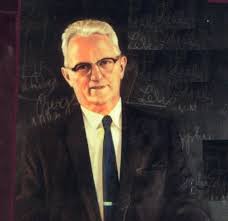Reformed Critics of Reid (Part Seven)
 Tuesday, August 28, 2018 at 02:23PM
Tuesday, August 28, 2018 at 02:23PM The Resurgence of Reid and Common Sense
Reformed Critics of Reid -- Reid and Warfield v. Kant and Van Til (Round Two)
When I mention Thomas Reid in the course of teaching apologetics, or in connection with the philosophical influences of SCSR upon Old Princeton (and the principal theologians who taught there–Charles Hodge and B. B. Warfield), many people admit that they have never heard of Reid, or know very little about him. This is not surprising–given Reid’s unfortunate obscurity. Others in conservative and confessional Reformed circles have a quite negative impression of Reid, describing his philosophy as “rationalistic” or as a species of Thomism. These responses are an indication that the party is not very familiar with Reid’s philosophy, has not read Reid, nor understands him correctly–not a surprise given the bad press Reid often gets. Reid, as we have seen, is not a rationalist, anything but. With the recent re-discovery of Reid among Reformed Epistemologists, Roman Catholic defenders of Thomism have sought to distance themselves from Reid’s epistemology, seeing his “common sense” formulation as incompatible with the foundationalism of St. Thomas (Russman, “Reformed Epistemology,” in Thomstic Papers IV, ed., Kennedy, 200). Much of this criticism of Reid and SCSR comes from the camp of the followers of Cornelius Van Til, who contend that Reid’s philosophy lay behind B. B. Warfield’s unwitting compromise of the defense of the faith through Old Princeton’s advocacy of an apologetic method naively grounded in Christian evidences. Van Tilians are quite correct right to connect Warfield to Reid and SCSR (with certain modifications in the direction of Reformed orthodoxy made by Warfield). Yet, they regard Warfield’s approach as necessarily entailing an appeal to “right reason” which, to their minds, is an impossibility in light of the damage done to humanity (and to our a priori categories and interpretive abilities) as a consequence of the fall. Unregenerate people cannot utilize reason “rightly.” Warfield, supposedly concedes too much to unbelieving thought–a self-defeating move.
Much of this criticism of Reid and SCSR comes from the camp of the followers of Cornelius Van Til, who contend that Reid’s philosophy lay behind B. B. Warfield’s unwitting compromise of the defense of the faith through Old Princeton’s advocacy of an apologetic method naively grounded in Christian evidences. Van Tilians are quite correct right to connect Warfield to Reid and SCSR (with certain modifications in the direction of Reformed orthodoxy made by Warfield). Yet, they regard Warfield’s approach as necessarily entailing an appeal to “right reason” which, to their minds, is an impossibility in light of the damage done to humanity (and to our a priori categories and interpretive abilities) as a consequence of the fall. Unregenerate people cannot utilize reason “rightly.” Warfield, supposedly concedes too much to unbelieving thought–a self-defeating move.
To make the case that Van Til’s call for a correction of Old Princeton’s apologetic was necessary, Van Tilians often embrace the critical scholarly consensus (Ernest Sandeen, Jack Rogers, Donald McKim, and John C. Vander Stelt) which concludes that Warfield was a rationalist of sorts who departed from the biblicism of Calvin, even echoing the ill-founded critical observation that Warfield’s endorsement of "right reason" amounts to an implicit exaltation of human reason over divine revelation.
But Warfield’s comments about right reason fully comport with the way in which the Reformed orthodox of prior generations (i.e., Turretin) spoke of an “ministerial use” of reason which was necessary to interpret the revelation which God gives, while at the same time rejecting a “magisterial” use of reason which determines the content of revelation (Muller, Post-Reformation Reformed Dogmatics, Vol. 1: Prolegomena to Theology, 243). Warfield’s appeal to right reason amounts to nothing more than the proper utilization of those rational powers given us from birth by our Creator. To use “right reason” rightly, we must operate within an epistemological framework like that set out by Reid. Christians can make appeal to those evidences given by God through divine revelation, i.e., our Lord’s resurrection and self-attestation to be the very Son of God, because the Apostles did. The Christian evidences marshaled by Warfield for Christ’s resurrection have their origin in God’s revelation, not in human reason.
Reid, Old Princeton, and Warfield are also sharply criticized by American church historians Mark Noll and George Marsden, who both follow the critical and Van Tilian party lines in assuming that Reid’s SCSR has rationalist tendencies which, they contend, are incompatible with Reformed orthodoxy (Riddlebarger, Lion of Princeton, 247-253). Marsden contends that SCSR was simply not up to the challenge raised by Darwinians regarding what it was exactly that was entailed by primitive common sense beliefs (Marsden, “The Collapse of American Evangelical Academia,” in Plantinga and Wolterstorff, eds., Faith and Rationality: Reason and Belief in God, 244). Because Charles Hodge and B. B. Warfield failed to realized this, Marsden and Noll conclude Old Princeton’s apologetic was severely, if unintentionally, handicapped by their failure to more closely follow Calvin and his true theological heirs, Abraham Kuyper and Herman Bavinck–both of whom B. B. Warfield highly regarded, yet openly criticized for abandoning apologetics altogether.


Reader Comments